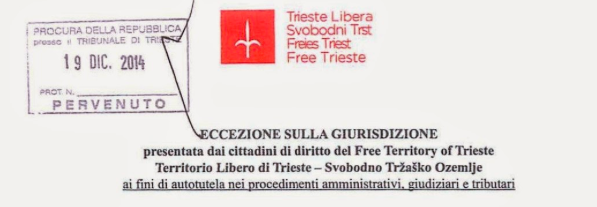
First page of the new exception on jurisdiction. Date on stamp: December 19th, 2014.
NEXT STEP: CIVIL DISOBEDIENCE
Trieste, 19 December 2014. – Today 50 members of the Free Trieste Movement lodged a new exception of jurisdiction before the Court of Trieste. It is an important step to protect the rights of all the citizens of the Free Territory.
The Court of Trieste is only the first office addressed with the new exception. The other administering Italian authorities are receiving it soon.
Starting with the Italian Government. Since 1954, the Italian Government has two roles. One as the Italian State’s elect Government. The other is that of temporary civil authority of the present-day Free Territory of Trieste.
And jurisdiction is one of its the powers. From 1947 to 1954, the British-US Government exercise jurisdiction over Trieste. Since 1954, adminsitering Trieste is the Italian Government’s duty.
Administration does not mean sovereignty.
This is why the people of Trieste are denying to be subject to the Italian State’s jurisdiction. As citizens of the Free Territory, they have the right and must be subject to the jurisdiction of their own State. Their State is the Free Territory of Trieste.
This does also mean that any act assuming Italian sovereignty or simulating it respect to citizens, institutions, or enterprises of the Free Territory is null and void for absolute lack of jurisdiction.
Finally, the people of the Free Territory of Trieste, lodging this new exception through Free Trieste, are also reserving the right to address the competent UN offices (the UNSC), to seek the intervention of the Signatories of the 1947 Treaty of Peace with Italy, of other UN Member States.
In case the Italian State ignores the exception and attempts to punish them, those people reserve the right to seek political asylum.
Translated from “Environment and Legality” by Roberto Giurastante
